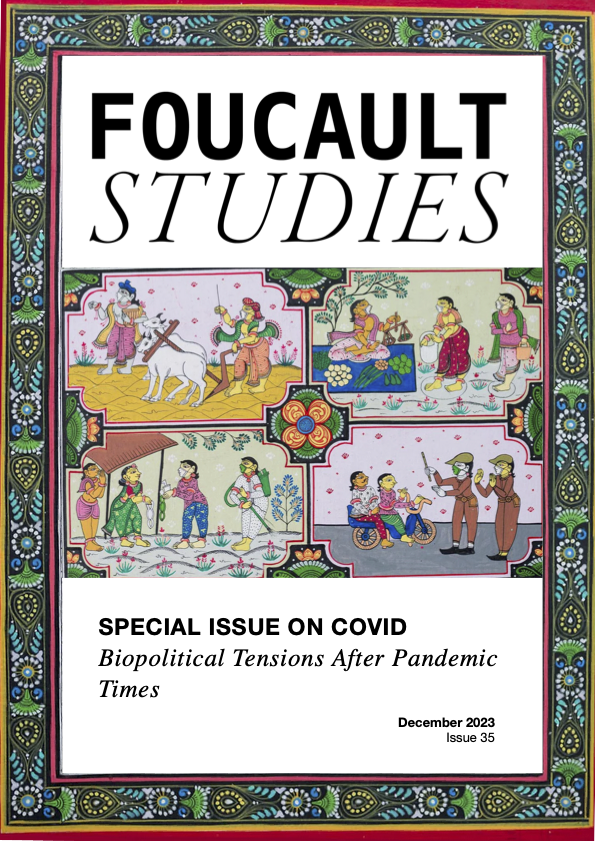Foucault Meets Novel Coronavirus: Biosociality, Excesses of Governmentality and the “Will to Live” of the Pandemicariat
DOI:
https://doi.org/10.22439/fs.i35.7088Nøgleord:
Foucault, Covid-19 pandemic, Governmentality, Biopolitical, Biosocial, Truncated sociality, PandemicariatResumé
This essay situates Foucault`s ideas of ‘biopower’ and ‘governmentality’ within the Indian context of the Covid emergency, analysing how the excesses of ‘biopolitical’ and the authoritarian forms of ‘governmentality’ evoke a radical re-reading of Foucault within Covid-infested India. We argue how pre-existing ‘discursive’ conditions of biomedical, digital, and neoliberal India facilitated more majoritarian and undemocratic forms of (bio)politics during the Indian experience of the pandemic, exposing the migrant workers in particular to tremendous ‘precarity’ and turning them into pandemicariat. To meet our theoretical ends, we investigate through forging links between Foucauldian theory – consisting of a set of concepts like biopolitics, anatomo-politics, governmentality etc— and ideas like transmuted biosociality, truncated sociality, will to live, pandemicariat etc. Current conditions of truncated sociality render human bodies more ‘discursively’ available for ‘biomedical’ and ‘biopolitical’ interventions, disempowering people’s capacity to sustain the more synthetic biosocial substances of conviviality. However, following Agamben’s early controversial stance for braving the virus, we would like to envisage “life” to be more than “survival” alone. We would also argue that the hard times of the pandemic invoke a new grammar of the “will to live” that was practised by the pandemicariat against heavy odds.Referencer
Agamben, Giorgio, Homo Sacer. Sovereign Power and Bare Life. Stanford: Stanford University Press, 1995.
Agamben, Giorgio, “The Enemy Is Not Outside, It Is within Us,” The Book Haven. http://bookhaven.stanford.edu/2020/03/giorgio-agamben-on-coronavirus-the-enemy-is-not-outside-it-is-within-us/ (accessed December 31, 2022)
Alam, Mursed, “Violence and perilous trans-borderal journeys: the Rohingyas as
the nowhere-nation precariats,” in Violence in South Asia: Contemporary Perspectives, ed. Pavan K. Malreddy, Anindya S. Purakayastha and Birte Heidemann, 127-143. New Delhi: Routledge, 2019.
Arnold, David, “Touching the Body: Perspectives on the Indian Plague 1896-1900,” in Se-lected Subaltern Studies, ed Ranajit Guha and Gayatri Chakravorty Spivak, 391-426. New York: Oxford University Press, 1988.
Beck, Ulrich, and Elisabeth Beck-Gernsheim, Individualization. Institutionalized Individualism and its Social and Political Consequences. London: Sage, 2002.
Bradley, Bridget, “From Biosociality to Biosolidarity: The Looping Effects of Finding and Forming Social Networks for Body-Focused Repetitive Behaviours”, Anthropology & Medicine 28:4 (2021), 543-557. https://doi.org/10.1080/13648470.2020.1864807
Butler, Judith, Precarious Life. The Powers of Mourning and Violence. London: Verso, 2004.
Butler, Judith, Frames of War. When is Life Grievable?. London and New York: Verso, 2009.
Chatterjee, Partha, The Present history of West Bengal. Essays in Political Criticism. Delhi: Ox-ford, 1997.
During, Simon, “Choosing Precarity,” South Asia: Journal of South Asian Research 38:1 (2015), 19-38. https://doi.org/10.1080/00856401.2014.975901
Durkheim, Emile, Elementary Forms of Religious Life. New York: Collier Books, 1961.
Foucault, Michel, “Society Must Be Defended,” in Essential Works of Foucault 1954 – 1984: Ethics (Volume 1), ed. Paul Rabinow, 59-66. London: Penguin, 1994.
Foucault, Michel, “The Birth of Biopolitics,” in Essential Works of Foucault 1954 – 1984: Eth-ics (Volume 1), ed. Paul Rabinow, 73-79. London: Penguin, 1994.
Foucault, Michel, “The Birth of Social Medicine,” in Essential Works of Foucault 1954 – 1984: Power (Volume 3), ed. James D. Faubion, 134-156. London: Penguin, 1994.
Foucault, Michel, “About the Concept of the ‘Dangerous Individual’ in the nineteenth Cen-tury Legal Psychiatry,” in Essential Works of Foucault 1954 – 1984: Power (Volume 3), ed. James D. Faubion, 176-200. London: Penguin, 1994.
Foucault, Michel, “Governmentality,” in Essential Works of Foucault 1954 – 1984: Power (Vol-ume 3), ed. James D. Faubion, 201-222. London: Penguin, 1994.
Foucault, Michel, “The Subject and Power,” in Essential Works of Foucault 1954 – 1984: Pow-er (Volume 3), ed. James D. Faubion, 326-348. London: Penguin, 1994.
Foucault, Michel, Discipline and Punish. The Birth of the Prison. New York: Vintage Books, A Division of random House, Inc, 1995.
Gothoskar, Sujata, “NITI Ayog’s proposal to cut food subsidies will Worsen India’s Rising Hunger Problem,” The Wire. https://thewire.in/government/niti-aayogs-proposal-to-cut-food-subsidies-will-worsen-indias-rising-hunger-problem (accessed December 31, 2022).
Mehta, Kriti, “COVID-19 containment plan: what are red, orange and green zone?,” Times NowNews.Com. https://www.timesnownews.com/india/article/coronavirus-zones-and-their-meanings-covid-19-containment-plan-what-are-red-orange-green-zones/580094 (accessed November 8, 2022).
Menon, Dilip, “Viral Histories: thinking in a pandemic,” Thesis Eleven. https://thesiseleven.com/2020/07/28/viral-histories-thinking-in-a-pandemic/ (accessed December 31, 2022).
Murray, Alex, Giorgio Agamben. London: Routledge, 2010.
Purakayastha, Anindya Sekhar, and Mursed Alam, “Scattered Chapatis, Mangled Bodies: Semiology for a Nation,” NewsClick. https://www.newsclick.in/scattered-chapatis-mangled-bodies-semiology-nation (accessed December 31, 2022).
Rabinow, Paul, “Introduction,” in The Foucault Reader: An Introduction to Foucault’s Thought, ed. Paul Rabinow, 3-29. London: Penguin, 1984.
Rabinow, Paul, “Right of Death and Power over Life,” in The Foucault Reader: An Introduc-tion to Foucault’s Thought, ed. Paul Rabinow, 258-272. London: Penguin, 1984.
Rabinow, Paul, “Artificiality and Intelligence: From Sociobiology to Biosociality,” in Essays on the Anthropology of Reason. Princeton, New Jersey: Princeton Universi-ty Press, 2006.
Rabinow, Paul, and Nicholas Rose, “Biopower Today,” Biosocieties 1 (2006), 195-217. https://doi.org/10.1017/S1745855206040014
Standing, Guy, The Precariat. The New Dangerous Class. London: Bloomsbury Academic, 2011.
Turner, Bryan S., The Body and Society. London: Sage, 1996.
Weber, Max, The Theory of Social and Economic Organisation. Glencoe, Illinois: The Free Press, 1947.
Downloads
Publiceret
Citation/Eksport
Nummer
Sektion
Licens

Dette værk er under følgende licens Creative Commons Navngivelse – Ikke-kommerciel – Ingen Bearbejdede Værker (by-nc-nd).
Authors retain copyright to their work, but assign the right of the first publication to Foucault Studies. The work is subject to a CC BY-NC-ND 4.0 license, but despite these restrictions, authors can take for granted that Foucault Studies will permit articles published in Foucault Studies to be translated or reprinted in another format such as a book providing a full reference is made to Foucault Studies as the original place of publication.



